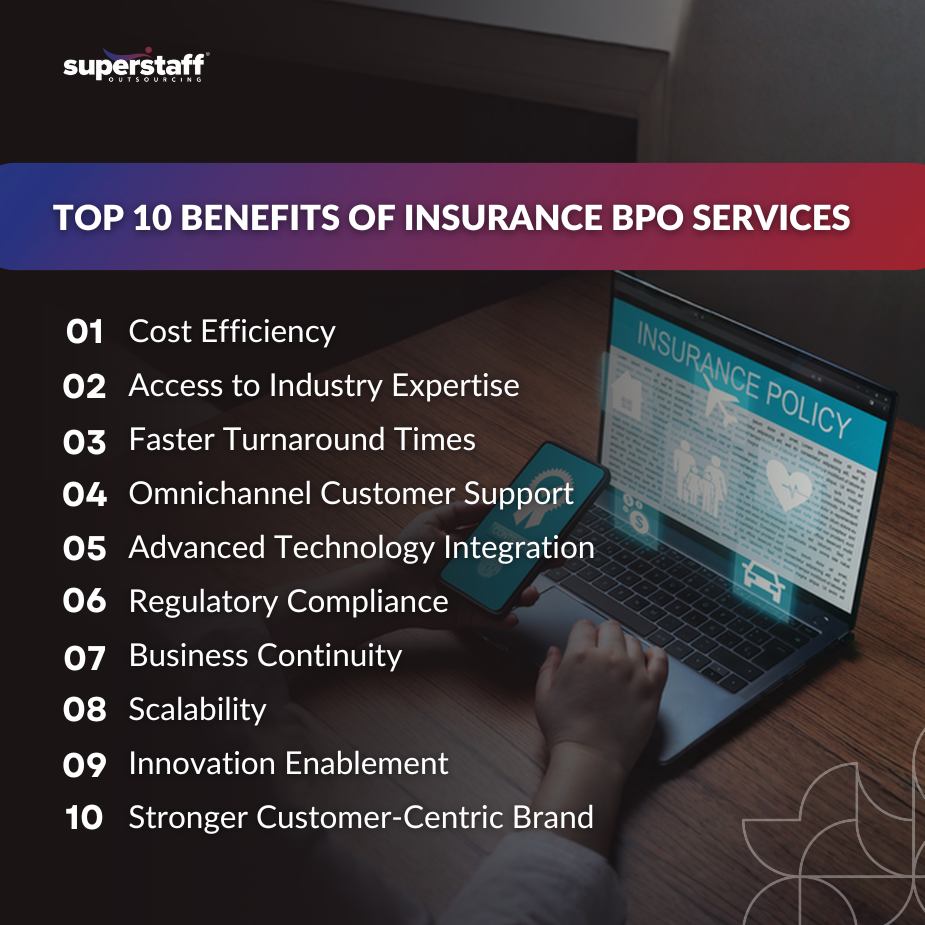
In 2025, the insurance industry faces more pressure than ever to do more with less, faster, more innovative, and more customer-focused. As policyholders demand quicker claims processing and seamless service, insurers are also contending with rising claim volumes, stricter regulatory scrutiny, and the growing complexity of risk. To stay competitive, providers must find ways to boost operational efficiency without compromising compliance or customer experience.
That’s where insurance BPO services come into play. By partnering with specialized outsourcing providers, insurers can offload time-consuming back-office tasks, streamline workflows, and tap into tech-enabled solutions designed for speed, accuracy, and scalability. These services go far beyond simple cost savings—they’re reshaping how modern insurance companies deliver value across the policyholder journey.
This blog examines the top 10 benefits of insurance BPO services in 2025 and why more companies are embracing outsourcing as a strategic lever for sustainable growth, agility, and enhanced customer satisfaction.
1. Cost Efficiency: A Primary Driver for Insurance BPO Adoption
Cost efficiency remains one of the most compelling reasons insurers turn to BPOs. In an industry where margin pressures are intensifying, outsourcing offers a proven path to financial stability.
By leveraging insurance BPO services, companies can significantly reduce their staffing, infrastructure, and administrative expenses. Instead of maintaining large in-house teams, insurers gain access to skilled professionals at a fraction of the cost. The availability of labor in more affordable regions allows BPOs to offer competitive rates without compromising service quality.
Flexible pricing models, such as pay-per-service or outcome-based contracts, allow insurers to scale services based on seasonal demands or business cycles. Moreover, experienced BPO teams help reduce the risk of compliance penalties by ensuring proper documentation and regulatory adherence.
Insurance BPO benefits are no longer limited to the bottom line. Beyond cost savings, providers offer specialized capabilities that drive long-term value.
2. Deep Industry Expertise at Your Fingertips
Insurance BPOs provide access to deep domain expertise and trained professionals. Their teams are composed of certified agents with extensive experience in underwriting, claims processing, fraud detection, and policy administration.
These professionals stay up to date with evolving regulations and market trends through continuous training programs. Their industry-specific knowledge allows them to handle complex tasks with efficiency and precision, leading to faster decision-making and fewer errors.
In-house teams benefit from this outside expertise through seamless collaboration and knowledge-sharing initiatives. As BPO providers invest in skill development, they bring fresh insights and new perspectives to the table, giving insurers a competitive edge.
With expertise comes speed and agility in process execution.
3. Speedier Turnaround Times, Happier Customers
Improved turnaround times lead to faster claims processing and elevated customer satisfaction. Insurance BPO services streamline operational workflows by combining human expertise with digital automation.
24/7 operations across global delivery centers allow BPOs to handle high volumes of inquiries and claims without delays. Tasks such as policy validation, claims assessment, and data entry can be automated or handled overnight, enabling insurers to meet aggressive SLAs.
SLA-driven performance metrics ensure consistency and accountability. Whether it’s settling a claim or updating policy details, faster resolution times translate to a more positive customer experience.
As speed improves, so does the customer experience.
4. Omnichannel Support that Deepens Customer Engagement
Outsourcing enhances customer engagement through omnichannel support strategies. Insurance BPOs are equipped to manage customer interactions across phone, email, chat, mobile apps, and social media, ensuring seamless service delivery.
Policyholders expect support to be available anytime, anywhere. BPOs meet these expectations by staffing around-the-clock teams trained in customer empathy, compliance, and brand voice alignment. Whether it’s answering questions about a new policy or assisting with a claim, reps are equipped to offer high-quality service on the first touchpoint.
Leveraging ongoing feedback loops and data analytics, insurance BPO services help insurers personalize support and fine-tune CX strategies. This directly impacts customer retention and trust.
Behind great customer service is advanced tech, and BPOs bring it.
5. Leveraging Technology for Operational Transformation
Insurance BPO services providers invest in cutting-edge technologies to modernize operations. They lead the digital transformation by integrating AI, machine learning, and predictive analytics into every facet of service delivery.
AI-powered chatbots handle basic inquiries, freeing up human agents for more complex tasks. Claims automation tools verify documents, detect fraud, and trigger resolution workflows. Predictive analytics assist underwriters in assessing risk more accurately, while robotic process automation (RPA) eliminates manual bottlenecks.
These tools not only boost efficiency but also provide actionable insights that guide strategic decisions. With technology as a differentiator, insurers gain the agility to meet market demands.
Technology also plays a major role in ensuring compliance.

6. Staying Ahead of Regulatory Changes
Insurance BPO services help insurers stay ahead of ever-changing regulatory requirements. Compliance is non-negotiable in the insurance sector, and BPOs provide the expertise and systems to ensure full adherence.
Real-time monitoring tools track legal updates across multiple jurisdictions. Dedicated compliance teams maintain audit-ready documentation, process reviews, and incident logs. This level of oversight reduces legal exposure and minimizes the risk of fines or reputational damage.
Additionally, BPO partners assist in updating Standard Operating Procedures (SOPs) to reflect evolving regulations—ensuring that customer-facing processes are always in sync with current laws.
Compliance strengthens trust—both internally and externally.
7. Business Continuity and Risk Mitigation
BPOs support business continuity and disaster recovery planning. In a world of increasing cyber threats, natural disasters, and economic uncertainty, having a resilient operational model is essential.
Insurance BPO services operate across multiple delivery centers, providing data redundancy, cloud-based storage, and real-time backup solutions. These capabilities ensure service continuity during disruptions.
Flexible staffing models allow insurers to quickly respond to surges in demand, such as during catastrophic events or open enrollment seasons. Crisis response protocols, including workforce reallocation and alternate routing, ensure that business processes never come to a halt.
This continuity lays the groundwork for agile scaling.
8. Seamless Scalability to Match Business Growth
BPOs allow insurance companies to scale operations rapidly without sacrificing quality. Whether launching a new product line or entering a new market, insurers can rely on outsourcing partners for scalable support.
Through on-demand talent pools, insurers gain instant access to trained professionals across functions. Modular service packages allow for easy expansion of capabilities—from policy issuance and claims management to billing and collections.
Multilingual teams also make it easier to expand into diverse markets while maintaining cultural and regulatory alignment.
Scalability also makes innovation more accessible.
9. Empowering Innovation Through Strategic Focus
BPOs foster innovation by freeing in-house teams to focus on strategy. With operational responsibilities handled externally, internal resources can be reallocated to high-value functions, such as product development, R&D, and market research.
This shift enables insurance companies to prioritize innovation rather than routine execution. Time-to-market improves, and companies can pilot new initiatives faster, whether it’s launching usage-based insurance models or implementing embedded finance.
By embracing insurance BPO services, companies unlock the flexibility and bandwidth to drive transformative growth.
Ultimately, it all ties back to one thing—customer satisfaction.
10. Building a More Customer-Centric Insurance Brand
The net effect of BPO partnerships is a stronger, more customer-centric insurance brand. When insurers focus on strategic priorities and partner with experts for operational support, customers feel the difference.
Faster response times, proactive communication, and personalized support all contribute to higher policyholder satisfaction. BPOs help insurers achieve better Net Promoter Scores (NPS), improved retention rates, and stronger brand loyalty.
The connection between outsourcing and CX is clear: How insurance BPO enhances customer satisfaction in 2025 is by creating frictionless, human-centered experiences at every touchpoint.
Ready to take the next step?
Final Takeaway: Insurance BPO Services as a Growth Engine
In 2025, insurance BPOs are more than cost-cutting tools—they’re strategic partners for growth, compliance, and customer satisfaction. As insurers navigate a complex and rapidly evolving landscape, outsourcing provides the expertise, technology, and scalability required to compete and thrive.
From reducing costs to unlocking innovation and building deeper customer trust, the insurance BPO benefits are far-reaching.
Explore how SuperStaff can help your insurance business thrive in 2025 and beyond. Connect with us today to get started.






